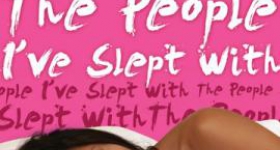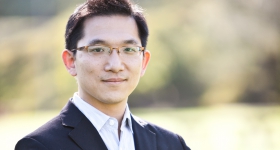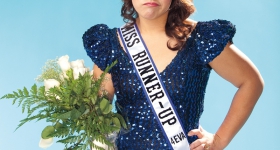As an intern tasked with sifting through the archives of the Center for Asian American Media (CAAM), Masashi Niwano spent countless hours filing more than 15 years of press kits promoting Asian and Asian American films. Even though he was studying film at San Francisco State University, he was stunned to discover that so many Asian American movies existed.
“Being exposed to all these different stories excited me,” Niwano says. “I wanted to see as many of these films as possible.”
Thus sparked Niwano’s passion for Asian American cinema. He would go on to serve for four years as executive director of the Austin Asian American Film Festival. This year, he was selected to lead CAAM’s San Francisco International Asian American Film Festival, the nation’s largest showcase for new Asian American and Asian films held annually since 1982.
In this except from a conversation we had with the 29-year-old second-generation Japanese American, Niwano discusses having Freddy Krueger as a “babysitter,” why the festival’s former director Chi-hui Yang is a stud and his plans for the 29th San Francisco International Asian American Film Festival, which will take place from March 10-20, 2011.
Where did your love for film come from?
Growing up in Campbell, CA, all my friends were asking for bikes, but what I really wanted was a video camera. My parents both had jobs that took them away from home in the evenings: My mother was a waitress and my father was president of a wholesale fish company. They would take me to rent movies to keep me busy. My favorites were slasher films like Nightmare on Elm Street and Friday the 13th. After watching these, I really wanted to make my own horror films, so I begged my mom for a video camera. My parents were supportive of my passion for filmmaking, buying me lighting kits and helping me recruit actors. My dad worked with freezers and butcher knives, and he let me use them as sets and props.
As a filmmaker, your films have screened at festivals across the United States, including South by Southwest and NewFest. In fact, your narrative short, Falling Stars, which was based on your experience of coming out to your best friend in college, was an official selection of the 2006 San Francisco International Asian American Film Festival. Do you plan to continue making films?
My first priority are my duties as festival director. Hopefully, as time goes on, I’ll have more time to get back into it. In December, I will be starting a video blog on CAAM’s website showcasing Asian American filmmakers, musicians and artists. I’m a musician myself and play the guitar.
What kind of struggles, if any, have you faced in the Asian American film scene?
While in Texas promoting the Austin Asian American Film Festival, someone from another local film festival asked in a derogatory manner why Asian Americans needed to have a film festival. It was an ignorant comment and served as fuel for me to show them what Asian American cinema was all about. Asian American film festivals are crucial to our communities. As a community, the only way we can grow stronger together is if we take time and truly understand each others’ unique histories and stories. Film festivals are an ideal space of this type of exploration.
Who are some up-and-coming filmmakers to look out for?
Tadashi Nakamura, I’m looking forward to his new Jake Shimabukuro documentary ... that is being produced by CAAM; H.P. Mendoza; PJ Raval, he’s an amazing filmmaker, who recently was the cinematographer for the Oscar-nominated doc Trouble the Water; Jessica Yu, I’ve loved all of her films, including Ping Pong Playa and In the Realms of the Unreal — I see a very bright future for her.
Where do you see Asians in the future of cinema?
Whether in Hollywood or through online outlets such as YouTube, I’ve never seen the Asian American community as driven and passionate about media making. I see a lot more Asian Americans behind the scenes and a lot of aspiring filmmakers breaking through. I don’t know if we’ll see that same parallel in front of the screen. I definitely think America is ready for more Asian American representation, but unless it makes studios more money, they aren’t going to change.
How do you feel about filling former festival director Chi-hui Yang’s shoes?
I’m both excited and really nervous. Chi-hui is seriously a stud! When I was an intern, I was struck by how passionate he was about the festival and cinema in general. The way he talked about filmmakers and the power of film, it inspired me and shaped my direction in life. I wanted to be like Chi-hui and to have his job. As festival director, you have the opportunity to influence the next generation of Asian Americans.
Can you give us a sneak peak of what to expect in next year’s festival?
I plan on bringing fun, exciting and avant-garde elements to the festival. I am a big fan of horror and experimental films and would like to see more of these films included. I also want to have more interactive events and more music.
Content condensed by editorial staff.









Comments